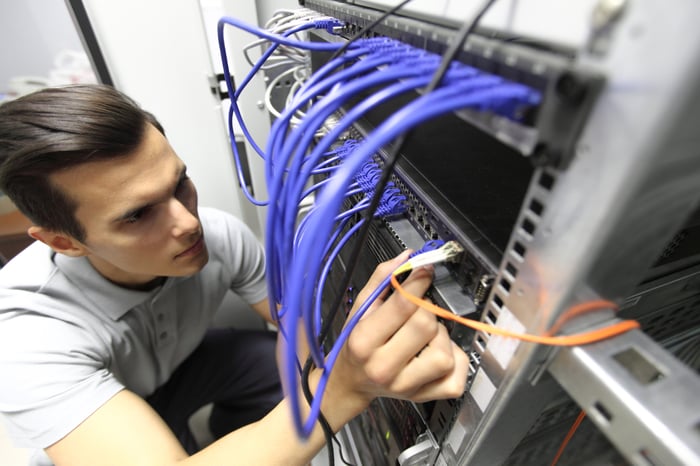For much of the last 30 years, investors have had a next-big-thing technology or trend to captivate their attention. The rise of the internet, business-to-business commerce, and cloud computing are just some of the big-dollar addressable markets that have lured investors.
But on rare occasion, two hot trends vie for Wall Street's attention at the same time. In 2024, we've witnessed the artificial intelligence (AI) revolution and stock-split euphoria converge to lift the stock market's major indexes to record-closing highs.

Image source: Getty Images.
A stock split is a tool publicly traded companies have available to cosmetically adjust their share price and outstanding share count by the same factor. What makes these share price adjustments "cosmetic" is that they have no impact on a company's market cap or operating performance.
Though there are two varieties of stock splits -- forward and reverse -- investors focus most of their attention on companies completing forward stock splits. Whereas reverse splits, which increase a company's share price, are often conducted from a position of operating weakness, the businesses enacting forward splits are pretty consistently outpacing their competition with regard to innovation and operational execution.
Since the start of 2024, a little north of a dozen noteworthy companies has announced and/or completed a stock split. All but one of these high-profile splits is of the forward variety, which aims to make shares more nominally affordable for everyday investors.
With AI stocks surging in 2024, it's no surprise that some of the most-prominent stock splits are leading AI companies. But after the close of trading today, Sept. 30, the most-anticipated AI stock split of the fourth quarter will take center stage.
Nvidia and Broadcom were Wall Street's preeminent AI stock splits of 2024
Over the last four months, Nvidia (NVDA -3.12%) and Broadcom (AVGO 1.84%) have hogged the headlines among artificial intelligence stocks -- and for good reason.
On May 22, Nvidia became the first AI stock to announce its intent to split its shares. Following a greater than $2 trillion increase in Nvidia's market cap in less than 17 months, the company's board declared a 10-for-1 forward split, which went into effect following the close of trading on June 7.
Nvidia's historic increase in value relates to its early stage dominance of the AI-graphics processing unit (GPU) market. The company's variety of GPUs, including the ultra-popular H100, hold a virtual monopoly in enterprise AI-accelerated data centers.
Investors are also clearly excited about the upcoming release of the next-generation Blackwell GPU architecture, which is considerably more energy efficient than its predecessor chip and can accelerate everything from generative Ai solutions to quantum computing calculations. Nvidia hasn't been shy about investing in innovation and should have no trouble retaining its AI-GPU computing advantages for the foreseeable future.
Meanwhile, AI networking solutions provider Broadcom announced its first-ever stock split in mid-June. This 10-for-1 forward split went into effect after the close of trading on July 12.
Just as businesses are counting on Nvidia's hardware to be the brains of high-compute data centers, Broadcom's networking solutions are leaned on to minimize response times for requests -- something critical for AI-driven software and systems -- and maximize the computing capacity of AI GPUs.
While Broadcom's rapid growth stems from its AI solutions, it's a company with a considerably more diverse revenue stream than leading AI stock Nvidia. For instance, it's one of the largest providers of wireless chips and accessories used in next-generation smartphones. A consistent device-replacement cycle fueled by the 5G revolution has been music to Broadcom's ears.
While Nvidia was the cream of the crop among AI stock-split stocks during the second quarter, and Broadcom's split hogged the spotlight in the third quarter, there's a new AI stock split ready for its moment in the sun.

Image source: Getty Images.
Wall Street's most-awaited AI stock split of the fourth quarter is here
When after-hours trading officially ends on Sept. 30, customizable rack server and storage solutions company Super Micro Computer (SMCI -0.42%) will complete its first-ever split since going public more than 17 years ago. Similar to Nvidia and Broadcom, Super Micro's split is 10-for-1, which will reduce its nominal share price to around $40 per share.
Shares of Super Micro have skyrocketed 779% over the trailing-two-year period, with demand for AI infrastructure leading the charge. Sales for the company more than doubled to $14.9 billion in fiscal 2024 (ended June 30), with the midpoint of the company's current guidance for fiscal 2025 at $28 billion. CEO Charles Liang foresees annual sales eventually reaching $50 billion.
Something else working in Super Micro's favor is the incorporation of Nvidia's prized H100 GPUs into its AI-focused rack servers. Relying on this top hardware has made it something of a go-to for businesses wanting to gain an edge over their competition and/or secure a first-mover advantage.
But there are, ultimately, two sides to this coin. While Nvidia's H100 is exceptionally popular and the preferred hardware choice in AI-accelerated data centers, it's also backlogged due to overwhelming demand. Super Micro Computer's reliance on Nvidia's AI-GPUs comes with the risk of not being able to meet the demand of its own clients.
Another risk for Super Micro Computer is the potential for the AI bubble to burst. There hasn't been a next-big-thing technology or trend for at least 30 years that's avoided a bubble-bursting event. This is to say that investors always overestimate how quickly a new technology or trend will be adopted and gain utility. With most businesses lacking a clear game plan to generate a positive return on their AI investment, at least in the early going, all signs point to artificial intelligence being the next in a long line of highly touted bubbles.
If the AI bubble were to burst, as history suggests it will, it wouldn't be the first time that hype surrounding Super Micro failed to live up to expectations. Growth forecasts for the company were through the roof in the mid-2010s. Unfortunately, the rise of cloud computing failed to meet these lofty expectations, which sent the company's stock spiraling lower.
I'd be remiss if I didn't also mention that noted short-seller Hindenburg Research has alleged that Super Micro Computer engaged in "accounting manipulation." The Wall Street Journal also reports that the U.S. Justice Department has launched an early stage probe into the company. Although Super Micro has denied these claims, the company did delay the filing of its annual report. Despite Liang stating that he has confidence in his company's internal teams and doesn't anticipate any material changes to the company's reported financials, this filing delay clearly has investors skittish.
With Super Micro Computer's much-anticipated stock split finally here, we'll soon find out which side of the aisle the retail investing community prefers.





